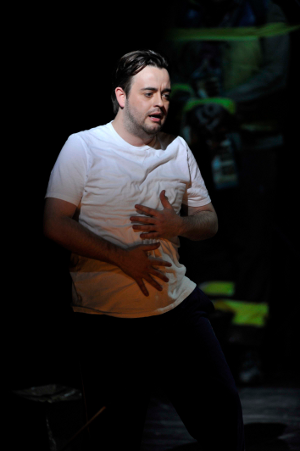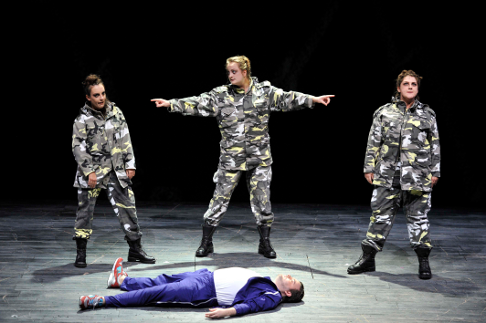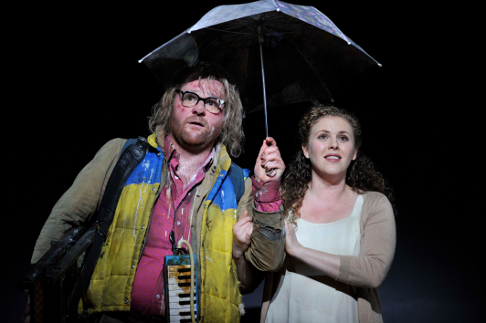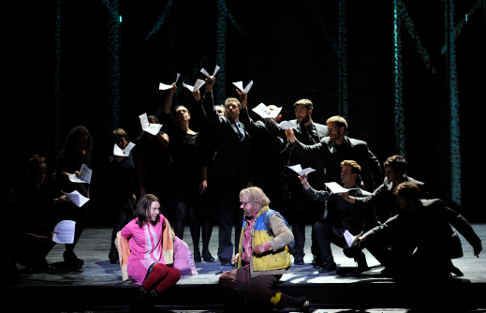![Cornelia Götz as The Queen of the Night [Photo by Robbie Jack courtesy of English National Opera]](http://www.operatoday.com/ENO_MF_07.png)
08 Nov 2013
The Magic Flute, ENO, London
Mozart’s The Magic Flute at the Coliseum could give the ENO a welcome boost.
English Touring Opera are delighted to announce a season of lyric monodramas to tour nationally from October to December. The season features music for solo singer and piano by Argento, Britten, Tippett and Shostakovich with a bold and inventive approach to making opera during social distancing.
This tenth of ten Live from London concerts was in fact a recorded live performance from California. It was no less enjoyable for that, and it was also uplifting to learn that this wasn’t in fact the ‘last’ LfL event that we will be able to enjoy, courtesy of VOCES8 and their fellow vocal ensembles (more below …).
Ever since Wigmore Hall announced their superb series of autumn concerts, all streamed live and available free of charge, I’d been looking forward to this song recital by Ian Bostridge and Imogen Cooper.
Although Stile Antico’s programme article for their Live from London recital introduced their selection from the many treasures of the English Renaissance in the context of the theological debates and upheavals of the Tudor and Elizabethan years, their performance was more evocative of private chamber music than of public liturgy.
Evidently, face masks don’t stifle appreciative “Bravo!”s. And, reducing audience numbers doesn’t lower the volume of such acclamations. For, the audience at Wigmore Hall gave soprano Elizabeth Llewellyn and pianist Simon Lepper a greatly deserved warm reception and hearty response following this lunchtime recital of late-Romantic song.
For this week’s Live from London vocal recital we moved from the home of VOCES8, St Anne and St Agnes in the City of London, to Kings Place, where The Sixteen - who have been associate artists at the venue for some time - presented a programme of music and words bound together by the theme of ‘reflection’.
'Such is your divine Disposation that both you excellently understand, and royally entertaine the Exercise of Musicke.’
‘And there was war in heaven: Michael and his angels fought against the dragon; and the dragon fought and his angels, And prevailed not; neither was their place found any more in heaven … that old serpent … Satan, which deceiveth the whole world: he was cast out into the earth, and his angels were cast out with him.’
There was never any doubt that the fifth of the twelve Met Stars Live in Concert broadcasts was going to be a palpably intense and vivid event, as well as a musically stunning and theatrically enervating experience.
‘Love’ was the theme for this Live from London performance by Apollo5. Given the complexity and diversity of that human emotion, and Apollo5’s reputation for versatility and diverse repertoire, ranging from Renaissance choral music to jazz, from contemporary classical works to popular song, it was no surprise that their programme spanned 500 years and several musical styles.
The Academy of St Martin in the Fields have titled their autumn series of eight concerts - which are taking place at 5pm and 7.30pm on two Saturdays each month at their home venue in Trafalgar Square, and being filmed for streaming the following Thursday - ‘re:connect’.
The London Symphony Orchestra opened their Autumn 2020 season with a homage to Oliver Knussen, who died at the age of 66 in July 2018. The programme traced a national musical lineage through the twentieth century, from Britten to Knussen, on to Mark-Anthony Turnage, and entwining the LSO and Rattle too.
With the Live from London digital vocal festival entering the second half of the series, the festival’s host, VOCES8, returned to their home at St Annes and St Agnes in the City of London to present a sequence of ‘Choral Dances’ - vocal music inspired by dance, embracing diverse genres from the Renaissance madrigal to swing jazz.
Just a few unison string wriggles from the opening of Mozart’s overture to Le nozze di Figaro are enough to make any opera-lover perch on the edge of their seat, in excited anticipation of the drama in music to come, so there could be no other curtain-raiser for this Gala Concert at the Royal Opera House, the latest instalment from ‘their House’ to ‘our houses’.
"Before the ending of the day, creator of all things, we pray that, with your accustomed mercy, you may watch over us."
The doors at The Metropolitan Opera will not open to live audiences until 2021 at the earliest, and the likelihood of normal operatic life resuming in cities around the world looks but a distant dream at present. But, while we may not be invited from our homes into the opera house for some time yet, with its free daily screenings of past productions and its pay-per-view Met Stars Live in Concert series, the Met continues to bring opera into our homes.
Music-making at this year’s Grange Festival Opera may have fallen silent in June and July, but the country house and extensive grounds of The Grange provided an ideal setting for a weekend of twelve specially conceived ‘promenade’ performances encompassing music and dance.
There’s a “slide of harmony” and “all the bones leave your body at that moment and you collapse to the floor, it’s so extraordinary.”
“Music for a while, shall all your cares beguile.”
The hum of bees rising from myriad scented blooms; gentle strains of birdsong; the cheerful chatter of picnickers beside a still lake; decorous thwacks of leather on willow; song and music floating through the warm evening air.
![Cornelia Götz as The Queen of the Night [Photo by Robbie Jack courtesy of English National Opera]](http://www.operatoday.com/ENO_MF_07.png)
Mozart’s The Magic Flute at the Coliseum could give the ENO a welcome boost.
Simon McBurney's production is audacious but absolutely true to Mozart's cheeky, irreverent generosity of spirit. Tamino and Papageno find Enlightenment (and the girls of their dreams) because they dare face the tests before them. Each takes the journey in his own way: the saga transcends time and place. From Greek myth to Parsifal, even to Star Wars, the allegory refreshes itself in endless retelling. It is a universal voyage of self-discovery.
 Ben Johnson as Tamino
Ben Johnson as Tamino
Simon McBurney and Complicité create dazzlingly imaginative theatre. Their A Dog's Heart was astonishingly vivid. The opera was a mess but the staging turned it into art. With Mozart, McBurney has infinitely better music, and rises to the challenge. As we hear the Overture, we see a hand write words in chalk on a blackboard. As the opera evolves we learn its significance. Words communicate. We see images of books on shelves, and up to the moment mobile devices. The stage above the stage is a laptop or Notebook. It's suspended on wires from the roof and looks dangerously fragile, but that in itself has meaning. Finn Ross's' video projections are among the best in the business, and extremely well integrated into the drama. Technology may change the ways we express ourselves, but if we don't communicate, or refuse to engage with each other, we're lost. At the end, chalk figures proclaim "WISDOM LOVE". Simple and austere but all the more powerful for that.
 Ben Johnson as Tamino (foreground), Rosie Aldridge, Eleanor Dennis, Clare Presland (L-R background) as the Three Ladies
Ben Johnson as Tamino (foreground), Rosie Aldridge, Eleanor Dennis, Clare Presland (L-R background) as the Three Ladies
Technology changes in theatre, too. Film and computer-generated images break down physical restraints of production and free imaginative possibilities. The Magic Flute IS magic after all, not realism. It cries for cosmic flights of fantasy. McBurney's designer, Michael Levine, gives us the night sky in all its glory : myriad sparkling stars in the firmament. The Queen of the Night (Cornelia Götz) in this production isn't spectacular but the forces she commands most certainly are. Extra-terrestrial sound effects amplify the sense of cosmic spaciousness. Off-stage noises are a natural part of staging. Here they rumble at the edge of consciousness. Gergely Madaras seems spurred to conduct with strong, dramatic flair. This highlighted the quiet moments when the Flute (Katie Bedfiord) emerged. The flute felt all the more magical and fragile. The Flute is more than an instrument. It is fundamental to the meaning of the opera. Like Papageno's bells, it evokes something pure, primeval and plaintive. McBurney's staging was musically as well as visually astute. The "birds" that fly in these woods were pieces of paper fluttering like the pages of books. Like the Flute and the bells, economy of gesture expresses deeper meaning.
This staging is beautiful, revealing its charms obliquely, much as the Singspiel tradition is more subtle than later forms of grand opera, and McBurney respects the vibe. The scene where Tamino and Pamina float, apparently suspended in space, surrounded by "birds" is magical. The English dialogue is genuinely witty. Papageno (Roland Wood) quaffs a bottle of Chateauneuf du papageno!
 Roland Wood as Papageno and Devon Guthrie as Pamina
Roland Wood as Papageno and Devon Guthrie as Pamina
The singing and acting were also above average for the ENO, hamstrung as it is by the need to do operas in a language other than those for which they were written. This cast delivered with panache, communicating their enthusiasm with style and wit, obliterating the lumpen ENO Die Fledermaus, killed not by the staging but by the performance.
Ben Johnson sang Tamino. He has stage presence..He even looks right, and creates a Tamino with personality, doggedly battling the situation he's in. His firm, assertive singing showed that Tamino is not a spoiled princeling but a man of character and resolve who can face what Sarastro, and the world, throws at him.
Roland Wood sang Papageno, ostensibly the lesser, low-born character in the opera but fundamental to its meaning. Princes abound in classical art, but Mozart gives us Everyman as non-hero in a strikingly modern way. From Papageno we can trace a line through to Siegfried and even to Wozzeck, a role taken by many good Papagenos, and one which Wood is surely destined for. The Papageno songs are harder to carry off than they seem because a singer has to express the role's innate nobility while acting the inept Fool. Spontaneous applause after the Papageno/Papagena duet., and very well deserved indeed. I didn't like the fake provincial accent and Little Britain connotations which English theatre is obsessed with, but Roland Wood's personality shines through the disguise.
 Mary Bevan as Papagena and Roland Wood as Papageno
Mary Bevan as Papagena and Roland Wood as Papageno
Mozart's arias for Sarastro are so resoundingly written that they evoke the idea of Sarastro as a figure beyond time, an acolyte, perhaps, of Egyptian gods. James Cresswell sang the part well, though he didn't quite suggest the complexity of the character: Sarastro has very dark sides. He's an unforgiving judge rather than a father figure. Cornelia Götz sang The Queen of the Night. Here, she's no Darth Vader vamp, as in some stagings, but a surprisingly vulnerable woman. Her Ladies (Eleanor Dennis, Clare Presland, Rosie Aldridge) extend her part. Monostratos (Brian Galliford) conveys the Alberich-like animalism, suggesting that he's a dark cousin of Papageno, gone bad.
Devon Guthrie sang a lovely Tamina and Mary Bevan a spirited, lyrical Papagena. The Three Spirits were Alessio D'Andrea, Finlay A'Court and Alex Karlsson, costumed as ancients, whose Norn-like purpose they serve.
This Magic Flute might confound those who want their Mozart vacuous, but those who truly love the opera will get a lot from this highly individual, perceptive approach.
For more details check the ENO website
Anne Ozorio